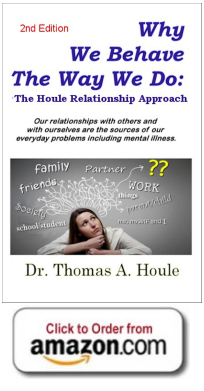 Dr. Houle, what are you trying to achieve with this book?
Dr. Houle, what are you trying to achieve with this book?
Well, my intention in writing this book is twofold:
First of all, I want to dispute the myth called “mental illness.” This myth is known as the “medical model” and, quite frankly, I simply don’t believe it.
Secondly, I want to offer an alternative explanation of mental, emotional and behavioral problems (MEBP). I call it the Houle Relationship Approach (HRA) and it addresses problems resulting from everyday living.
Please elaborate on the beliefs you're challenging with this work.
I have worked as both a clinical psychologist and clinical social worker for several decades I’ve come to realize that problematic human behavior is in no way a disease nor an illness. So, as have many other clinicians had to do, I created a realistic working model to deal with these behaviors that my clients were presenting.
The model I found relevant, was to address these behaviors as just that, behaviors and not diseases or symptoms of diseases as the medical model directs. Instead, the HRA address them as behaviors that are learned and not illnesses bestowed upon us by an aberrant biological process, which is the view that the medical model endorses.
Can you tell us more about the concept behind the HRA?
The book advances the notion that all MEBP occur within the context of one or more of our several relationships. Within any given relationship, the source of the MEBP can be traced to the structural element that makes up that relationship. There are at least four structural elements in all relationships.
It’s these elements around which those people involved in the relationship interact. It is around these elements that the rules of the relationship are developed. These are the rules or the expected behaviors that those in the relationship are supposed to follow. If anyone violates these these rules then MEBP occur.
Can you describe your writing process for the book?
To prepare for writing the book I began by gathering the reviews of the scientific studies addressing mental illness as a disease. After that I set about organizing the material garnered from my clinical experience. This latter material is what forms the Houle Relationship Approach.
With all the material gathered, I then set about to organize it in a sequence so that the writing would flow in an easy, understandable and, hopefully, logical manner.
Were there any challenges in writing this book?
There were obvious and ongoing challenges associated with gathering, organizing and writing the material. Once these were met and overcome, usually on a continual basis, another more troubling challenge presented itself. That challenge was to present the material in a manner that avoided the use of clinical jargon.
A problem underlying that challenge, is that clinical jargon itself is often imprecise, obtuse and foreign to many. So to write for those who want to read and understand their own behavior, more common language must be used. However, common everyday terms that can be used are usually unavailable and when present, require extensive definitions to accompany them. Hopefully I overcame the clinical jargon challenge.
Popular Articles
So, What's Really The Problem?
Knowing The Rules Of The Road
Copyright©2020-2024.
Dr. Thomas A. Houle.
All rights reserved.

